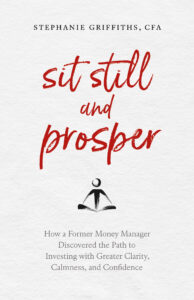
Stephanie Griffiths shelved her 2016 MFA book project — which she describes as “an investment guide for people who feel they should know more about investing but find the topic intimidating, boring, or just too complicated” — after several traditional publishers had turned it down.
And then last year a friend asked her for help with his own book, and that “reminded me how much I used to care about mine. I rewrote the whole thing last winter, updating a lot of the information and making it more personal and less financial.”
But this time she decided to try a different path to publication. “I had no enthusiasm for rewriting the book proposal and re-pitching the book. I’m still not famous and have no interest in trying to either lie about that or convince people it’s a non-issue.”
Instead, she signed up with PageTwo, an experienced Vancouver-based self-publishing firm that specializes in nonfiction. She couldn’t have been happier with the “effort and care that went into every detail—the title, the cover design, the copy editing, setting everything up online for print-on-demand and eBook distribution. They’re fabulous.”
Sit Still and Prosper: How a Former Money Manager Discovered the Path to Investing with Greater Clarity, Calmness, and Confidence is now available in paperback print-on-demand and as an e-book from most online retailers. Stephanie’s website: StephanieGriffiths.ca
Although she spent 17 years in the finance industry, Griffiths says that was really “a detour” from her writing ambitions. She’d begun the journalism graduate program at Ryerson in 1990 but, halfway through, “I had a baby I couldn’t afford.” She switched to finance. “My research skills from journalism school were a huge competitive advantage, but I missed writing.”
She discovered the new King’s Master of Fine Arts in Creative Nonfiction program in 2014 from a brochure she picked up at a journalism event. “I’d been thinking about going back to school for an MBA, but the MFA was much more appealing.”
She describes her book project as “the story of how I changed my approach to investing, but also to my life, after I left the industry and started seeing it through the eyes of a consumer rather than an expert, travelling across North America meeting the pioneers of a new generation of consumer-friendly financial solutions. It’s a cross between David Chilton and Pema Chödrön, in the style of Michael Lewis,” she adds. “Or, Buddhism as a financial strategy.”
Although she remembers the idea of the MFA mentoring process “terrifying because I hadn’t written anything in 20 years except quarterly performance commentary for my mutual fund,” she is quick to add that her mentors “gave me a lot of positive feedback, but also plenty of practical advice on how to improve my writing.”
Kim Pittaway, one of her mentors and now the executive director of the program, calls Griffiths’ book “well written and engaging.”

